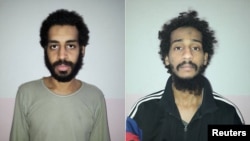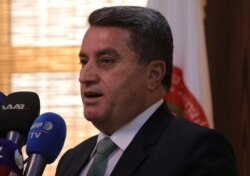The United States has taken custody of two Islamic State (IS) prisoners accused of taking part in the beheading of American journalists in 2014, U.S. and Kurdish officials said Thursday.
U.S. President Donald Trump said in a tweet Thursday that two IS prisoners held by Kurdish forces in Syria were transferred over to U.S. military custody.
The transfer takes place amid fears that U.S.-backed Kurdish forces can no longer guarantee they can continue detaining the prisoners as Turkey has begun a military offensive to remove Syrian Kurdish fighters from parts of the Syria-Turkey border.
Currently outside of Syria
A U.S. defense official also confirmed to VOA that the U.S. military has taken custody of IS militants from Kurdish forces in Syria. They didn't comment on their nationality or why they were taken from Kurdish forces.
"We have taken military custody of two high-value ISIS individuals. They are being held in military custody pursuant to the law of war," the official told VOA.
The U.S. official added the two IS prisoners are currently being held "outside of Syria," without naming any country.
On Wednesday, Trump told reporters the United States has moved what he calls some of the "most dangerous" IS prisoners from Kurdish custody to "different locations where it's secure."
Abdulkarim Omar, co-chair of the Foreign Department at the Kurdish-led Autonomous Administration in northeast Syria, confirmed the transfer of the two British-born IS militants, but refused to give further details about the transfer.
"Taking two prisoners isn't enough. Keeping these dangerous people here is becoming a more difficult task for us," he told VOA.
The Beatles
The two men were taken from a Kurdish-run prison in northern Syria, where Kurdish forces can no longer guarantee they can keep detaining the prisoners after the Turkish military incursion.
The two men are Alexanda Kotey and El Shafee Elsheikh, The Washington Post reported Wednesday. One U.S. official told the Post they have been taken to Iraq.
The two men were allegedly part of a quartet of British-born Islamic militants who their hostages dubbed "The Beatles."
"The Beatles" were led by an IS militant named Mohammed Emwazi, nicknamed "Jihadi John."
Emwazi beheaded American journalist James Foley, Israeli American journalist Steven Sotloff and U.S. aid worker Peter Kassig before a TV camera in 2014.
"The Beatles" are also suspected of murdering other Western hostages.
Emwazi was killed in a U.S. drone strike in 2015. A fourth "Beatle" is in a Turkish prison.
Kotey and Elsheikh, who have denied taking part in the executions, were captured by Kurdish forces. They told The Washington Post in a prison interview last year that their role was to carry out ransom negotiations.
U.S. trial
Experts believe the two IS prisoners were likely taken into U.S. military custody because they had a role in executing American citizens.
"This is all likely happening since they don't want certain individuals back out on the streets and to return to IS and then start planning external operations or local massacres again," said Aaron Zelin, a terrorism expert at the Washington Institute for Near East Policy.
"The U.S. government is likely coordinating these efforts with the Department of Justice so that they will eventually be tried in a U.S. court system," he told VOA.
If the two are brought to the United States for trial, they could be charged as conspirators in hostage-taking resulting in death — a charge that carries a possible death sentence, according to the Post.
British authorities have stripped the two individuals of their citizenship, making it harder to repatriate them to face charges in the U.K.
But experts said the U.S. judicial system has more flexibility to prosecute such cases, especially since the accused men have been involved in harming U.S. citizens.
IS prisoners
Some critics of Trump's decision to pull U.S. forces out of northeastern Syria say that the ensuing Turkish offensive against the U.S.-allied Syrian Democratic Forces (SDF), could allow thousands of imprisoned IS fighters to flee.
The SDF, a Kurdish-led military alliance that has been an effective U.S. partner in the fight against IS, say they are holding nearly an 11,000 IS fighters, following the defeat of IS's so-called caliphate in March 2019.
Kurdish official Omar said these IS prisoners, including more than 2,200 foreign fighters, are held in at least 30 prisons across northeast Syria.
"I don't think the Americans will take any other ISIS prisoners at this point," he said.
Omar added that one prison came under a Turkish attack Wednesday, causing "a major panic among our men who guard [IS] prisoners."
Kurdish military officials also told local media the artillery attack near the city of Qamishli caused damage to nearby buildings, but no reports of any harm to the prison itself.
For months, the U.S. has been urging Western countries and others to take back and prosecute their citizens who left to join IS. U.S officials have also called upon western countries to repatriate family members who traveled to or were born into the terror group's self-declared caliphate. But those calls have largely gone unheeded.
Trump said on Wednesday the U.S. has tried unsuccessfully to convince several European countries — including Britain, France, and Germany — to take back their citizens who joined IS as foreign fighters and have been captured.



